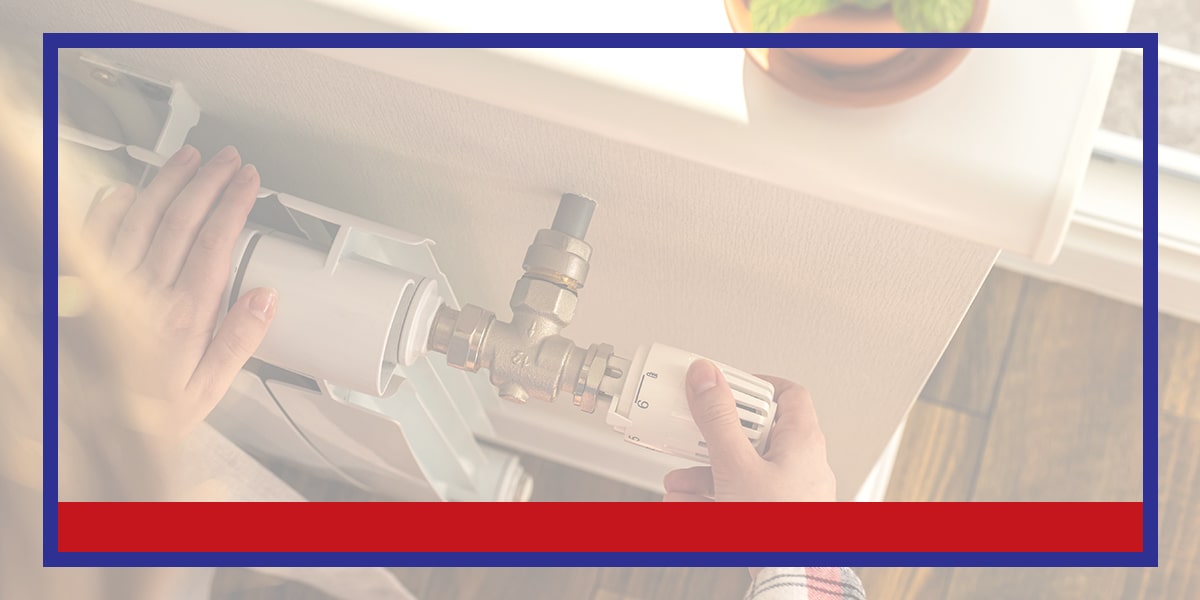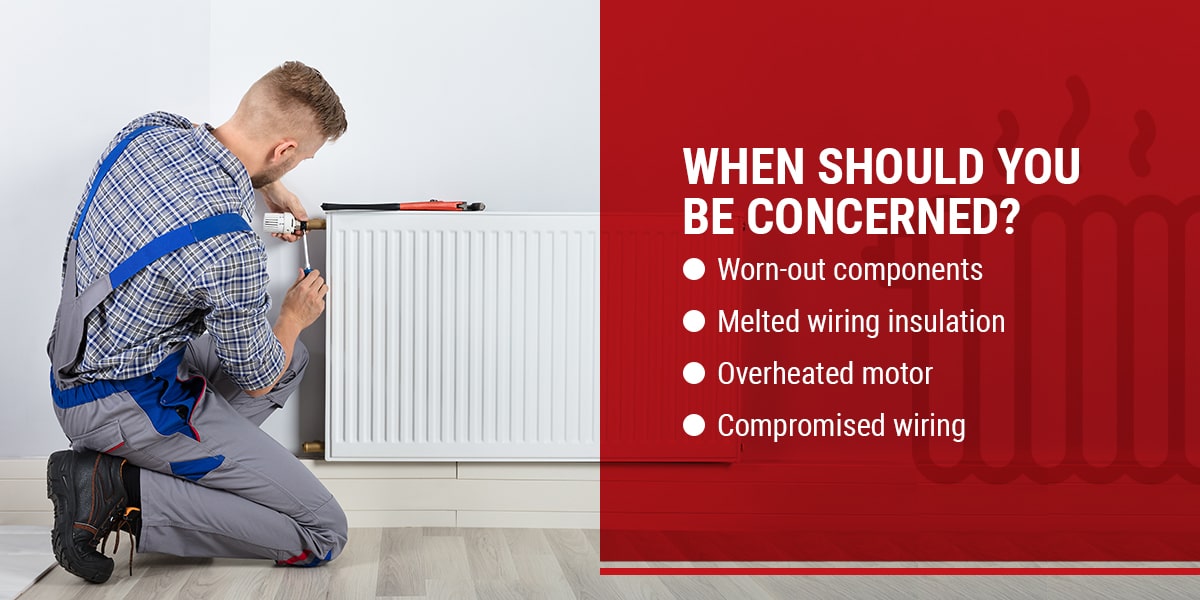Why Your Heater Smells Like It’s Burning

As we move into fall and winter, you will likely turn your heater on and may notice a smell of burning. The burning smell in heaters, electric pumps or furnaces may not be anything to worry about. You can often expect this smell from the furnace or other heating equipment when you first turn it on. However, in certain circumstances, it could become a safety concern.
Understanding why your heater smells burnt can help differentiate between which odors are potential safety hazards and which are not.
Why Does Your Heater Smell Burnt?
There are several reasons for the burning smell in heaters, especially if they’ve been left unused for long periods. When you turn your heater on after months of it gathering dust, the dust that has settled on it starts to burn away. There’s nothing to be too concerned about here, and the burnt smell should dissipate in a matter of hours.
You may also experience a burnt smell if debris is in your heating system. The burnt smell would be a little musty in this case. Try to identify the blockage in the system by going from room to room and noting if there’s a specific area where the smell is most potent. Isolating the blockage will make it easier to remove.
Having a trustworthy HVAC technician inspect your furnace before turning it on in the fall is advisable. Getting your heater checked and performing regular maintenance will also minimize the typical burnt smell.
When Should You be Concerned?
Not all burning smells are harmless. If the burnt odor persists after more than two heating cycles, you could have a more serious problem on your hands. Pay more attention to any of the following:
- Worn-out components: If heater parts have worn through, such as the fan belt or capacitor, the odor will be similar to burnt plastic. Make sure nothing more serious happens, and replace the parts as soon as possible.
- Melted wiring insulation: An electrical fault in the heated system can cause the wiring insulation to melt, which will also smell like burnt plastic. If you think you’re experiencing an electrical fault, turn your heating system off immediately and have a reliable HVAC technician fix the problem before it becomes more serious.
- Overheated motor: An overheated blower motor will cause an electrical burning smell, which is never good news. If your filter is clogged or dirty, it can restrict airflow to the motor and cause it to overheat. Continual overheating can be a fire hazard, and a professional should address the problem immediately.
- Compromised wiring: It’s not common to have wiring issues in your heating system, but it can happen. Electrical issues can be severe, so if you suspect your problem is electrical, please don’t hesitate to call for professional assistance.
Structural or electrical damage to your heating system poses a real risk. Your heating system can quickly become a fire hazard if a qualified HVAC technician does not address these issues as soon as possible.
What Safety Risks Are There When Your Heater Smells Burnt?
Why does your heater smell like it’s burning? Though it could be as simple as excess dust or the need for an oil change, it’s advisable to be cautious, especially when the source of the burning smell is difficult to locate or the smell persists for more than a couple of heating cycles. Ensure you reach out to a trusted HVAC technician to diagnose and solve the problem.
The most reliable way to ensure your heater isn’t posing any potential risks is to have it checked and maintained by professionals at least once a year. Try to time these routine maintenance checks before switching your heater on every year to avoid potential poisonous gases and other hazards. Some of the reasons to make sure your heater is maintained on an annual basis include preventing the following:
- Releasing of carbon monoxide gas: A cracked heating element can release carbon monoxide into your home, which can be deadly. A faulty gas valve could end up doing the same thing.
- Cracking of heat exchangers: If a heat exchanger cracks or breaks, it can result in an open flame that will quickly spread, possibly endangering people and pets inside the home.
- Failing to prevent gas build-up: Should the flame sensor be faulty, it may not register the gas build-ups. If the gas is allowed to build up for too long, it could result in an explosion.
Having heat in your home makes for a cozy and inviting environment as long as you’re cautious and take unusual burning smells seriously. Do an annual check to prevent property damage and alleviate potential safety concerns for the occupants of your home. If anything in your heating system makes you uncomfortable, call a technician to deal with the problem immediately. You should enjoy warmth and peace of mind this winter.
Can You Avoid the Burning Smell From Your Heater?
Even if the burnt smell coming from the furnace is nothing to worry about, it can be most unpleasant for the home’s occupants. While some people like the smell, it’s unbearable for others. The smell can be expected and still undesirable. So, is there anything you can do to avoid that smell when you first switch your heater on at the start of the season? Here are some tips and tricks you can use to reduce the burnt smell in your home:
- Open the windows: When you turn your heating system on each fall, ensure all the windows are open so the odor can dissipate as quickly as possible.
- Change the filters: As dirty filters are the culprit for that musty burnt smell, make sure to have your filters changed by a professional before you switch your heater on when it starts getting cold outside.
- Remove debris from the vents: If something is stuck in the vents and it’s safe to remove it on your own, you can do so. It would be wise to call an HVAC technician just in case, as you may not be able to remove everything safely.
- Turn off your unit: If you suspect something more serious is going on with your heating system, turn everything off immediately, and call a technician to check it before you turn it back on again.
Again, the most effective way to reduce the burnt smell in your heating system is to ensure everything is functioning as it should be. Your HVAC technician should be available to answer any questions or address any concerns you may have about your heater. Please don’t be shy to reach out and discuss things with them.
Regular maintenance can extend the life of your heating system, but there comes a time when you may need to replace your old heater if your HVAC technician can no longer repair the damage. Contact a reputable HVAC installer to ensure you can heat your home at the right price.
Contact Metro Services HVAC to Keep Your Heating System Safe
Maryland gets pretty cold this time of year, and you need a fully functional heater or furnace up and running before the cold weather hits you. Preventive furnace maintenance allows you to prevent potentially unsafe situations and make regular repairs. Improve your system’s energy efficiency and lower your energy and repair costs with Metro Services HVAC.
You can enjoy over 20 years of experience in heating system tune-ups when you call Metro Services HVAC. If there’s an emergency, we can be with you the same day. Enjoy the warmth in your home uninterrupted. Feel free to contact us today to book your heating system for maintenance!


